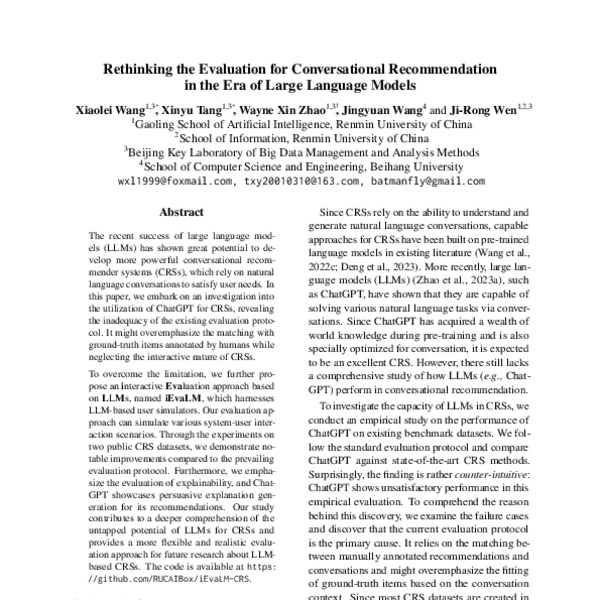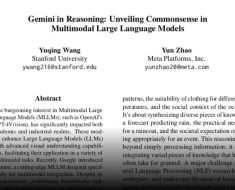
@inproceedings{wang-etal-2023-rethinking-evaluation,
title = "Rethinking the Evaluation for Conversational Recommendation in the Era of Large Language Models",
author = "Wang, Xiaolei and
Tang, Xinyu and
Zhao, Xin and
Wang, Jingyuan and
Wen, Ji-Rong",
editor = "Bouamor, Houda and
Pino, Juan and
Bali, Kalika",
booktitle = "Proceedings of the 2023 Conference on Empirical Methods in Natural Language Processing",
month = dec,
year = "2023",
address = "Singapore",
publisher = "Association for Computational Linguistics",
url = "https://aclanthology.org/2023.emnlp-main.621",
doi = "10.18653/v1/2023.emnlp-main.621",
pages = "10052--10065",
abstract = "The recent success of large language models (LLMs) has shown great potential to develop more powerful conversational recommender systems (CRSs), which rely on natural language conversations to satisfy user needs. In this paper, we embark on an investigation into the utilization of ChatGPT for CRSs, revealing the inadequacy of the existing evaluation protocol. It might overemphasize the matching with ground-truth items annotated by humans while neglecting the interactive nature of CRSs. To overcome the limitation, we further propose an **i**nteractive **Eva**luation approach based on **L**L**M**s, named **iEvaLM**, which harnesses LLM-based user simulators. Our evaluation approach can simulate various system-user interaction scenarios. Through the experiments on two public CRS datasets, we demonstrate notable improvements compared to the prevailing evaluation protocol. Furthermore, we emphasize the evaluation of explainability, and ChatGPT showcases persuasive explanation generation for its recommendations. Our study contributes to a deeper comprehension of the untapped potential of LLMs for CRSs and provides a more flexible and realistic evaluation approach for future research about LLM-based CRSs.",
}
<?xml version="1.0" encoding="UTF-8"?>
<modsCollection xmlns="http://www.loc.gov/mods/v3">
<mods ID="wang-etal-2023-rethinking-evaluation">
<titleInfo>
<title>Rethinking the Evaluation for Conversational Recommendation in the Era of Large Language Models</title>
</titleInfo>
<name type="personal">
<namePart type="given">Xiaolei</namePart>
<namePart type="family">Wang</namePart>
<role>
<roleTerm authority="marcrelator" type="text">author</roleTerm>
</role>
</name>
<name type="personal">
<namePart type="given">Xinyu</namePart>
<namePart type="family">Tang</namePart>
<role>
<roleTerm authority="marcrelator" type="text">author</roleTerm>
</role>
</name>
<name type="personal">
<namePart type="given">Xin</namePart>
<namePart type="family">Zhao</namePart>
<role>
<roleTerm authority="marcrelator" type="text">author</roleTerm>
</role>
</name>
<name type="personal">
<namePart type="given">Jingyuan</namePart>
<namePart type="family">Wang</namePart>
<role>
<roleTerm authority="marcrelator" type="text">author</roleTerm>
</role>
</name>
<name type="personal">
<namePart type="given">Ji-Rong</namePart>
<namePart type="family">Wen</namePart>
<role>
<roleTerm authority="marcrelator" type="text">author</roleTerm>
</role>
</name>
<originInfo>
<dateIssued>2023-12</dateIssued>
</originInfo>
<typeOfResource>text</typeOfResource>
<relatedItem type="host">
<titleInfo>
<title>Proceedings of the 2023 Conference on Empirical Methods in Natural Language Processing</title>
</titleInfo>
<name type="personal">
<namePart type="given">Houda</namePart>
<namePart type="family">Bouamor</namePart>
<role>
<roleTerm authority="marcrelator" type="text">editor</roleTerm>
</role>
</name>
<name type="personal">
<namePart type="given">Juan</namePart>
<namePart type="family">Pino</namePart>
<role>
<roleTerm authority="marcrelator" type="text">editor</roleTerm>
</role>
</name>
<name type="personal">
<namePart type="given">Kalika</namePart>
<namePart type="family">Bali</namePart>
<role>
<roleTerm authority="marcrelator" type="text">editor</roleTerm>
</role>
</name>
<originInfo>
<publisher>Association for Computational Linguistics</publisher>
<place>
<placeTerm type="text">Singapore</placeTerm>
</place>
</originInfo>
<genre authority="marcgt">conference publication</genre>
</relatedItem>
<abstract>The recent success of large language models (LLMs) has shown great potential to develop more powerful conversational recommender systems (CRSs), which rely on natural language conversations to satisfy user needs. In this paper, we embark on an investigation into the utilization of ChatGPT for CRSs, revealing the inadequacy of the existing evaluation protocol. It might overemphasize the matching with ground-truth items annotated by humans while neglecting the interactive nature of CRSs. To overcome the limitation, we further propose an **i**nteractive **Eva**luation approach based on **L**L**M**s, named **iEvaLM**, which harnesses LLM-based user simulators. Our evaluation approach can simulate various system-user interaction scenarios. Through the experiments on two public CRS datasets, we demonstrate notable improvements compared to the prevailing evaluation protocol. Furthermore, we emphasize the evaluation of explainability, and ChatGPT showcases persuasive explanation generation for its recommendations. Our study contributes to a deeper comprehension of the untapped potential of LLMs for CRSs and provides a more flexible and realistic evaluation approach for future research about LLM-based CRSs.</abstract>
<identifier type="citekey">wang-etal-2023-rethinking-evaluation</identifier>
<identifier type="doi">10.18653/v1/2023.emnlp-main.621</identifier>
<location>
<url>https://aclanthology.org/2023.emnlp-main.621</url>
</location>
<part>
<date>2023-12</date>
<extent unit="page">
<start>10052</start>
<end>10065</end>
</extent>
</part>
</mods>
</modsCollection>
%0 Conference Proceedings %T Rethinking the Evaluation for Conversational Recommendation in the Era of Large Language Models %A Wang, Xiaolei %A Tang, Xinyu %A Zhao, Xin %A Wang, Jingyuan %A Wen, Ji-Rong %Y Bouamor, Houda %Y Pino, Juan %Y Bali, Kalika %S Proceedings of the 2023 Conference on Empirical Methods in Natural Language Processing %D 2023 %8 December %I Association for Computational Linguistics %C Singapore %F wang-etal-2023-rethinking-evaluation %X The recent success of large language models (LLMs) has shown great potential to develop more powerful conversational recommender systems (CRSs), which rely on natural language conversations to satisfy user needs. In this paper, we embark on an investigation into the utilization of ChatGPT for CRSs, revealing the inadequacy of the existing evaluation protocol. It might overemphasize the matching with ground-truth items annotated by humans while neglecting the interactive nature of CRSs. To overcome the limitation, we further propose an **i**nteractive **Eva**luation approach based on **L**L**M**s, named **iEvaLM**, which harnesses LLM-based user simulators. Our evaluation approach can simulate various system-user interaction scenarios. Through the experiments on two public CRS datasets, we demonstrate notable improvements compared to the prevailing evaluation protocol. Furthermore, we emphasize the evaluation of explainability, and ChatGPT showcases persuasive explanation generation for its recommendations. Our study contributes to a deeper comprehension of the untapped potential of LLMs for CRSs and provides a more flexible and realistic evaluation approach for future research about LLM-based CRSs. %R 10.18653/v1/2023.emnlp-main.621 %U https://aclanthology.org/2023.emnlp-main.621 %U https://doi.org/10.18653/v1/2023.emnlp-main.621 %P 10052-10065
Markdown (Informal)
[Rethinking the Evaluation for Conversational Recommendation in the Era of Large Language Models](https://aclanthology.org/2023.emnlp-main.621) (Wang et al., EMNLP 2023)


